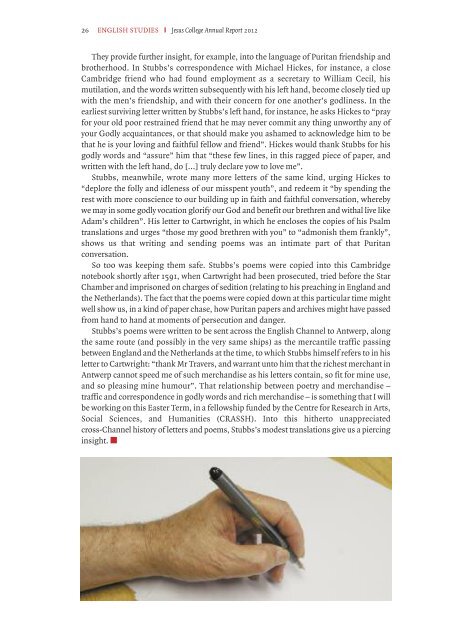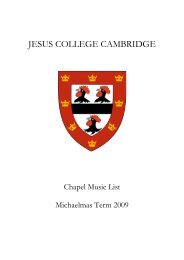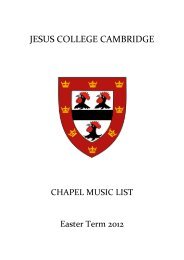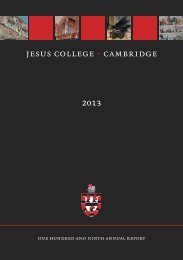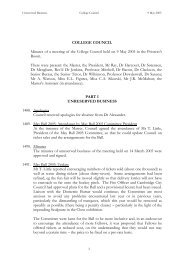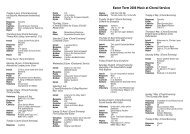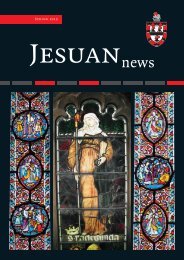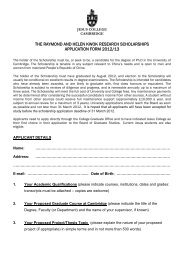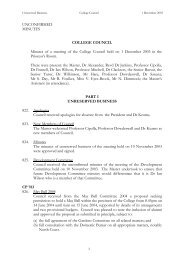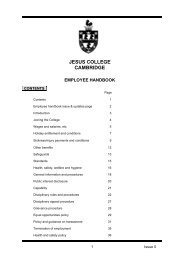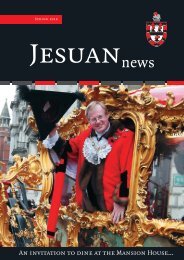2012 Annual Report - Jesus College - University of Cambridge
2012 Annual Report - Jesus College - University of Cambridge
2012 Annual Report - Jesus College - University of Cambridge
Create successful ePaper yourself
Turn your PDF publications into a flip-book with our unique Google optimized e-Paper software.
26 ENGLISH STUDIES I <strong>Jesus</strong> <strong>College</strong> <strong>Annual</strong> <strong>Report</strong> <strong>2012</strong><br />
They provide further insight, for example, into the language <strong>of</strong> Puritan friendship and<br />
brotherhood. In Stubbs’s correspondence with Michael Hickes, for instance, a close<br />
<strong>Cambridge</strong> friend who had found employment as a secretary to William Cecil, his<br />
mutilation, and the words written subsequently with his left hand, become closely tied up<br />
with the men’s friendship, and with their concern for one another’s godliness. In the<br />
earliest surviving letter written by Stubbs’s left hand, for instance, he asks Hickes to “pray<br />
for your old poor restrained friend that he may never commit any thing unworthy any <strong>of</strong><br />
your Godly acquaintances, or that should make you ashamed to acknowledge him to be<br />
that he is your loving and faithful fellow and friend”. Hickes would thank Stubbs for his<br />
godly words and “assure” him that “these few lines, in this ragged piece <strong>of</strong> paper, and<br />
written with the left hand, do [...] truly declare yow to love me”.<br />
Stubbs, meanwhile, wrote many more letters <strong>of</strong> the same kind, urging Hickes to<br />
“deplore the folly and idleness <strong>of</strong> our misspent youth”, and redeem it “by spending the<br />
rest with more conscience to our building up in faith and faithful conversation, whereby<br />
we may in some godly vocation glorify our God and benefit our brethren and withal live like<br />
Adam’s children”. His letter to Cartwright, in which he encloses the copies <strong>of</strong> his Psalm<br />
translations and urges “those my good brethren with you” to “admonish them frankly”,<br />
shows us that writing and sending poems was an intimate part <strong>of</strong> that Puritan<br />
conversation.<br />
So too was keeping them safe. Stubbs’s poems were copied into this <strong>Cambridge</strong><br />
notebook shortly after 1591, when Cartwright had been prosecuted, tried before the Star<br />
Chamber and imprisoned on charges <strong>of</strong> sedition (relating to his preaching in England and<br />
the Netherlands). The fact that the poems were copied down at this particular time might<br />
well show us, in a kind <strong>of</strong> paper chase, how Puritan papers and archives might have passed<br />
from hand to hand at moments <strong>of</strong> persecution and danger.<br />
Stubbs’s poems were written to be sent across the English Channel to Antwerp, along<br />
the same route (and possibly in the very same ships) as the mercantile traffic passing<br />
between England and the Netherlands at the time, to which Stubbs himself refers to in his<br />
letter to Cartwright: “thank Mr Travers, and warrant unto him that the richest merchant in<br />
Antwerp cannot speed me <strong>of</strong> such merchandise as his letters contain, so fit for mine use,<br />
and so pleasing mine humour”. That relationship between poetry and merchandise –<br />
traffic and correspondence in godly words and rich merchandise – is something that I will<br />
be working on this Easter Term, in a fellowship funded by the Centre for Research in Arts,<br />
Social Sciences, and Humanities (CRASSH). Into this hitherto unappreciated<br />
cross-Channel history <strong>of</strong> letters and poems, Stubbs’s modest translations give us a piercing<br />
insight. ■


